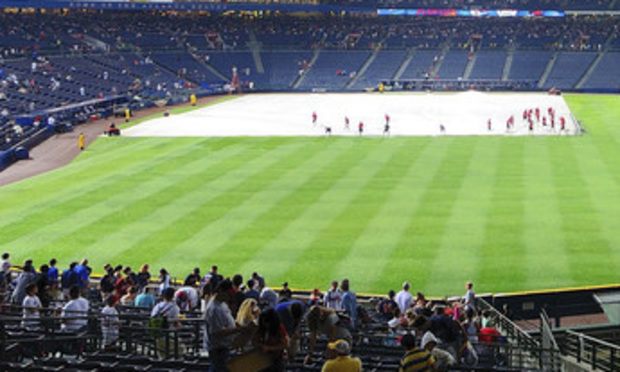Phillies File Suit to Save the Phanatic From Copyright Claim
The Phillies allege that the New York creator of Miss Piggy is threatening to make the Phanatic a free agent if the team doesn't pay millions of dollars for two weeks of work 41 years ago.
August 02, 2019 at 09:04 PM
5 minute read

The Philadelphia Phillies filed a federal lawsuit Friday saying that the New York designer who four decades ago helped create the costume for the team’s beloved mascot, the Phanatic, is trying to kidnap him for the equivalent of copyright ransom.
The team’s lawyers are asking the U.S. District Court for the Southern District of New York to declare that the Phanatic belongs to the Phillies forever, and no one can take the mascot away.
The team is suing Wayde Harrison and Bonnie Erickson of Harrison/Erickson Inc. They’re a husband-wife design team. Erickson once worked with Muppet creator Jim Henson on Sesame Street. She was known as the creator of Miss Piggy before she went on to mascots and other creatures.
They could not be reached immediately for comment. Their attorneys have not yet been entered into the record.
David Wolfsohn of Duane Morris in New York is leading the Phillies legal team. “Everything you need to know is in the complaint,” Wolfson said Friday shortly after filing it.
All the information, along with a lot of pictures of the fuzzy figure at the center of the dispute. The complaint tells the Phanatic’s life story.
“In the late 1970s, then-Phillies Executive Vice President Bill Giles developed a vision for a new Phillies mascot: He would be green, fat, furry, big-nosed, and instantly accessible to children,” the complaint began.
Gates even came up with the name—“the Phillie Phanatic,” the complaint said. He would be a soft, furry embodiment of “the quintessential fanatical Phillies fan.” His mission would be to “engage in audacious slapstick routines, playfully teasing anyone within range of the field or the stands—players, umpires, sportscasters, managers, and fans.”
In March 1978, Giles and other Phillies personnel worked with Harrison/Erickson to develop a costume for the Phanatic, according to specified criteria. The complaint said the defendants worked on the costume for about two weeks, paying various “costumers” $4 an hour to build it, for a total cost of about $2,000.
A Phillies marketing department intern named Dave Raymond was the first to wear the costume and “bring it to life,” the complaint said. Raymond debuted the Phanatic at the April 25, 1978, home game. “Raymond and the Phanatic were an instant hit,” the complaint said. By that summer, Bonnie Erickson herself declared the Phanatic had become “wildly popular,” it said.
“H/E was paid well for their 2 weeks of work and $2,000 or so of expense,” the complaint said. “Under 1978 and 1979 license agreements with The Phillies, they earned over $200,000 by the end of January 1980.”
Then, in 1984, “H/E terminated the 1979 license agreement and used its strong bargaining position to negotiate an assignment (‘the 1984 Assignment’) of all of H/E’s rights for $215,000—about $533,000 in today’s dollars,” the complaint said. “The 1984 Assignment expressly states that the transfer of these rights is ‘forever.’”
Now, the Phanatic is 41.
“Over the last 41 years, the Club has devoted millions of dollars to developing and promoting the Phanatic,” the complaint said. “Dave Raymond appeared as the Phanatic thousands of times until his retirement in 1994. Since then, Tom Burgoyne and others have donned Phanatic costumes thousands of times as well. Raymond, Burgoyne, and other Phillies employees have developed hundreds of slapstick routines at the ballpark, and made thousands of appearances, many at charity events.”
Add to that dozens of new costumes, scores of giveaways and merchandise items and millions spent on advertising.
“All of this was suddenly threatened when The Phillies received a letter from H/E’s attorneys in June 2018 purporting to give notice of termination of the 1984 Assignment, notwithstanding H/E’s agreement that it would be ‘forever,’” the complaint said. “The letter falsely claimed that H/E had ‘created the copyrighted character’ of the Phanatic, and ignored The Phillies’ role in designing the Phanatic’s costume.”
The complaint said the letter falsely claimed the New York couple had the right to terminate the 1984 Assignment and that, “if The Phillies did not negotiate a fifth agreement with H/E, the Club would not be able to ‘continue to use the Phillie Phanatic’ after June 15, 2020.”
Since that letter, the complaint said Harrison and Erickson have “threatened to obtain an injunction against the Phillies’ use of the Phanatic” and to “make the Phanatic a free agent” if the Club does not renegotiate the 1984 assignment and agree to pay “millions of dollars.”
The complaint said that threat is legally baseless.
“The Club therefore requests that this Court put an immediate end to H/E’s effort to hold up The Phillies with its threats of legal action and to make the Phanatic a free agent,” the complaint said. “By issuing a declaratory judgment in The Phillies’ favor and an injunction against H/E’s threatened actions, the Court will ensure that Phillies fans will not be deprived of their beloved mascot of 41 years and that The Phillies’ investment of creativity, time, effort, and money in the Phanatic will not be liquidated by H/E.”
The case is Phillies v. Harrison/Erickson Inc., No. 19-7239.
This content has been archived. It is available through our partners, LexisNexis® and Bloomberg Law.
To view this content, please continue to their sites.
Not a Lexis Subscriber?
Subscribe Now
Not a Bloomberg Law Subscriber?
Subscribe Now
NOT FOR REPRINT
© 2025 ALM Global, LLC, All Rights Reserved. Request academic re-use from www.copyright.com. All other uses, submit a request to [email protected]. For more information visit Asset & Logo Licensing.
You Might Like
View All
Ex-DLA Piper, Ballard Spahr Atty Accused of Aiding Video Game Company Founder's Misappropriation Scheme
5 minute read
From M&A to Music Fest, Ballard Spahr Attorney Hosts Week-Long Jam Session With Help of Clients
5 minute read
$43.5M Med Mal Verdict for Ex-Eagles Team Captain Withstands Appellate Challenge

Pa. Casinos Ask Court to Force State to Tax Skill Games Found in Stores Equally to Slots
3 minute readTrending Stories
- 1'A Shock to the System’: Some Government Attorneys Are Forced Out, While Others Weigh Job Options
- 2Lackawanna County Lawyer Fails to Shake Legal Mal Claims Over Sex With Client
- 3Florida Judge Denies Motion to Dismiss in $150M Plane Crash Lawsuit Involving Flow La Movie
- 4HSF Accounts Show US Operating Losses Last Year But Revenue Increased Slightly
- 5Sheppard Mullin, Morgan Lewis and Baker Botts Add Partners in Houston
Who Got The Work
J. Brugh Lower of Gibbons has entered an appearance for industrial equipment supplier Devco Corporation in a pending trademark infringement lawsuit. The suit, accusing the defendant of selling knock-off Graco products, was filed Dec. 18 in New Jersey District Court by Rivkin Radler on behalf of Graco Inc. and Graco Minnesota. The case, assigned to U.S. District Judge Zahid N. Quraishi, is 3:24-cv-11294, Graco Inc. et al v. Devco Corporation.
Who Got The Work
Rebecca Maller-Stein and Kent A. Yalowitz of Arnold & Porter Kaye Scholer have entered their appearances for Hanaco Venture Capital and its executives, Lior Prosor and David Frankel, in a pending securities lawsuit. The action, filed on Dec. 24 in New York Southern District Court by Zell, Aron & Co. on behalf of Goldeneye Advisors, accuses the defendants of negligently and fraudulently managing the plaintiff's $1 million investment. The case, assigned to U.S. District Judge Vernon S. Broderick, is 1:24-cv-09918, Goldeneye Advisors, LLC v. Hanaco Venture Capital, Ltd. et al.
Who Got The Work
Attorneys from A&O Shearman has stepped in as defense counsel for Toronto-Dominion Bank and other defendants in a pending securities class action. The suit, filed Dec. 11 in New York Southern District Court by Bleichmar Fonti & Auld, accuses the defendants of concealing the bank's 'pervasive' deficiencies in regards to its compliance with the Bank Secrecy Act and the quality of its anti-money laundering controls. The case, assigned to U.S. District Judge Arun Subramanian, is 1:24-cv-09445, Gonzalez v. The Toronto-Dominion Bank et al.
Who Got The Work
Crown Castle International, a Pennsylvania company providing shared communications infrastructure, has turned to Luke D. Wolf of Gordon Rees Scully Mansukhani to fend off a pending breach-of-contract lawsuit. The court action, filed Nov. 25 in Michigan Eastern District Court by Hooper Hathaway PC on behalf of The Town Residences LLC, accuses Crown Castle of failing to transfer approximately $30,000 in utility payments from T-Mobile in breach of a roof-top lease and assignment agreement. The case, assigned to U.S. District Judge Susan K. Declercq, is 2:24-cv-13131, The Town Residences LLC v. T-Mobile US, Inc. et al.
Who Got The Work
Wilfred P. Coronato and Daniel M. Schwartz of McCarter & English have stepped in as defense counsel to Electrolux Home Products Inc. in a pending product liability lawsuit. The court action, filed Nov. 26 in New York Eastern District Court by Poulos Lopiccolo PC and Nagel Rice LLP on behalf of David Stern, alleges that the defendant's refrigerators’ drawers and shelving repeatedly break and fall apart within months after purchase. The case, assigned to U.S. District Judge Joan M. Azrack, is 2:24-cv-08204, Stern v. Electrolux Home Products, Inc.
Featured Firms
Law Offices of Gary Martin Hays & Associates, P.C.
(470) 294-1674
Law Offices of Mark E. Salomone
(857) 444-6468
Smith & Hassler
(713) 739-1250





